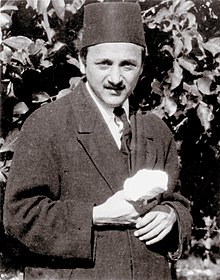
Back Shoghi Effendi Afrikaans شوقي أفندي Arabic Şövqi Əfəndi Azerbaijani Шәүҡи Әфәнде Bashkir شۆقی ئەفەندی CKB Shoghi Effendi Czech Shoghi Effendi German Shoghi Effendi Rabbání Esperanto Shoghi Effendi Spanish Shoghi Effendi Basque
Shoghi Effendi | |
|---|---|
شوقی افندی | |
 Effendi in Haifa, 1921 | |
| In office 1921–1957 | |
| Preceded by | ʻAbdu'l-Bahá |
| Succeeded by | Universal House of Justice |
| Personal life | |
| Born | Shoghí Rabbání 1 March 1897 Acre, Ottoman Empire (now Israel) |
| Died | 4 November 1957 (aged 60) |
| Resting place | New Southgate Cemetery, London 51°37′26″N 0°08′39″W / 51.6240°N 0.1441°W |
| Nationality | Iranian |
| Spouse | |
| Parents |
|
| Relatives | ʻAbdu'l-Bahá (grandfather) Baháʼu'lláh (great-grandfather) |
| Signature |  |
| Religious life | |
| Religion | Baháʼí Faith |
| Lineage | Afnán (see: § Ancestry) |
| Part of a series on the |
| Baháʼí Faith |
|---|
 |
Shoghí Effendi (/ˈʃoʊɡiː ɛˈfɛndi/;[a] Persian: شوقی افندی;1896 or 1897[b] – 4 November 1957) was Guardian of the Baháʼí Faith from 1922 until his death in 1957.[3] As the grandson and successor of ʻAbdu'l-Bahá, he was responsible for creating a series of teaching plans that oversaw the expansion of the Baháʼí Faith to a number of new countries, and also translated many of the written works of crucial Baháʼí leaders. Upon his death in 1957 leadership passed to the Hands of the Cause, and in 1963 the Baháʼís of the world elected the Universal House of Justice, an institution which had been described and planned by Baháʼu’llah.[4]
Effendi, an Afnán, was born Shoghí Rabbání[c] in ʻAkká (Acre) where he spent his early life,[5] but later went on to study in Haifa and Beirut, gaining an arts degree from the Syrian Protestant College in 1918 and then serving as ʻAbdu'l-Bahá's secretary and translator. In 1920, he attended Balliol College, Oxford, where he studied political science and economics, but before completing his studies news reached him of ʻAbdu'l-Bahá's death, requiring him to return to Haifa. Shortly after his return at the end of December 1921 he learned that in his Will and Testament ʻAbdu'l-Bahá' had named him as the Guardian of the Baháʼí Faith.[6] Shoghi Effendi's clear vision for the Baháʼí Faith's progress was inherited from ʻAbdu'l-Bahá and based on the original writings of Baháʼu’llah, two particularly important aspects of his leadership focused on building its administration and spreading the faith worldwide.[7]
During his 36 years as Guardian Shoghi Effendi translated and expounded on many of the writings of Bahá’u’lláh and ʻAbdu'l-Bahá, established plans by which the faith was enabled to spread globally,[4] and sent more than 17,500 letters. He kept in touch with progress in all existing Bahá’i communities as well as monitoring and responding to the situation in the Middle East, where the believers were still suffering persecution. He also began work on establishing Haifa, Israel, as the Bahá’i World Center, and created an International Bahá’i Council to aid him in his work, several members being newly appointed Hands of the Cause. He also presided over the community's enlargement from 1,034 localities in 1935 to 2,700 in 1953, and further to 14,437 localities in 1963. From the beginning to the end of his leadership, the total population of Baháʼís around the world grew from 100,000 to 400,000.[8]
Shoghi Effendi passed away during a visit to London in 1957, having contracted Asian flu,[9] and is buried at New Southgate Cemetery in the city of London.[10]
Cite error: There are <ref group=lower-alpha> tags or {{efn}} templates on this page, but the references will not show without a {{reflist|group=lower-alpha}} template or {{notelist}} template (see the help page).
- ^ Rabbani 1957.
- ^ Giachery 1973, p. 205.
- ^ Smith 2000, p. 314. sfn error: multiple targets (2×): CITEREFSmith2000 (help)
- ^ a b Hartz 2009, p. 13. sfn error: multiple targets (3×): CITEREFHartz2009 (help)
- ^ Momen 2011.
- ^ Smith 2000, p. 315. sfn error: multiple targets (2×): CITEREFSmith2000 (help)
- ^ Hartz 2009, p. 80. sfn error: multiple targets (3×): CITEREFHartz2009 (help)
- ^ Hartz 2009, p. 79-84. sfn error: multiple targets (3×): CITEREFHartz2009 (help)
- ^ Stockman 2022, p. 115. sfn error: multiple targets (5×): CITEREFStockman2022 (help)
- ^ Smith 2000, p. 316. sfn error: multiple targets (2×): CITEREFSmith2000 (help)